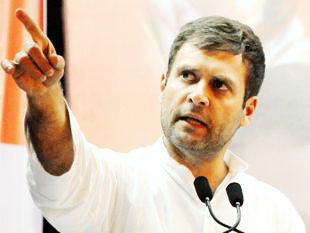 Doda, Apr 11: Congress vice-president Rahul Gandhi made his first frontal attack on the BJP prime ministerial candidate Narendra Modi for suppressing his marital status in the affidavits submitted to the Election Commission over the last many years.
Doda, Apr 11: Congress vice-president Rahul Gandhi made his first frontal attack on the BJP prime ministerial candidate Narendra Modi for suppressing his marital status in the affidavits submitted to the Election Commission over the last many years.
Addressing an election campaign, Mr. Gandhi pooh-poohed BJP's “rhetoric of dignity and empowerment of women”. He asserted that there were huge gaps between what the BJP and its prime ministerial candidate Mr. Modi had been telling the people of India through media and “absurd posters” and what they actually were up to.
“I don't know how many elections he has contested. But it is for the first time (in his political career) that he has described himself as married”, Mr Gandhi said about Mr. Modi, suggesting in sarcasm that more of his secrets could tumble out of the cupboard. “In Delhi, same people claim through posters that giving dignity and empowerment to the women was on the top of their agenda and manifesto”, Mr. Gandhi said.
Mr. Gandhi also referred to an incident of phone tapping in Gujarat and questioned how Chief Minister Modi and the police had stalked a young woman and violated her privacy with the misuse of official position and resources. “What kind of women's empowerment and dignity is this, I want to know”, he said.
Mr. Gandhi said it was shameful that the women were feeling insecure and disempowered in all the BJP-ruled states. He said one BJP government was known for unleashing terror and injustice on women in Karnataka and another BJP government’s Ministers were caught on camera watching videos on their cellphone inside the Assembly. “You must be knowing, must have read in newspapers what kind of films they had been watching”, Mr. Gandhi said, raising questions over BJP's and Mr. Modi’s hype about the dignity and empowerment of women during their election campaign.
Mr. Gandhi gave a rundown of the major developmental projects the Congress-led UPA government had taken up and commissioned in Jammu and Kashmir. He said that the under-construction rail link and upgradation of the national highway into an expressway, as an extension of the UPA’s ambitious North-South Corridor, were significant landmarks of change and development in northern India.
In his address earlier, National Conference leader and Chief Minister Omar Abdullah alleged that BJP and Mufti Mohammad Sayeed's Peoples Democratic Party were on an axis of division and parochialism in the current Parliamentary elections. “They know it that they are not the winners but they desperately attempt to divide the vote”, Mr. Abdullah said. Mr. Azad was away with his campaign in Udhampur and Samba districts reportedly due to some compulsion of the model code of conduct.





Comments
Add new comment